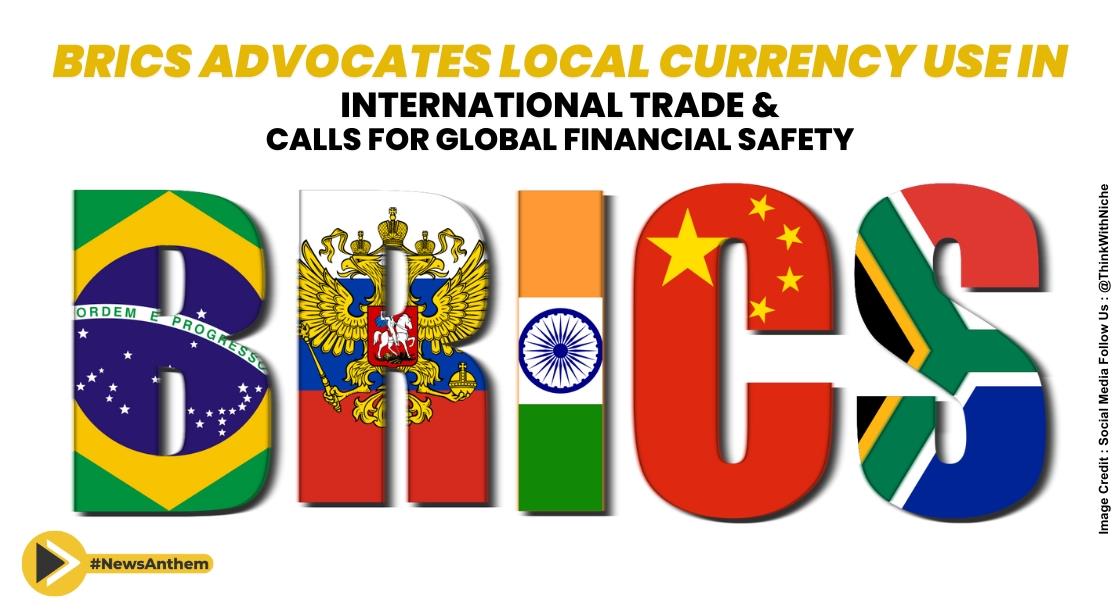BRICS Advocates Local Currency Use in International Trade and Calls for Global Financial Safety

News Synopsis
BRICS Nations Advocate Local Currency Use and Global Financial Safety
The BRICS nations, consisting of Brazil, Russia, India, China, and South Africa, recently released a joint statement underscoring the importance of utilizing local currencies in international trade and financial transactions. The statement also emphasized their commitment to supporting a rule-based, open, and transparent global trade system.
Promoting Local Currency Use and Multilateral Trading System
The joint statement, titled 'The Cape of Good Hope,' expressed the BRICS nations' support for a free, transparent, inclusive, equitable, and non-discriminatory multilateral trading system. They highlighted the significance of the World Trade Organization (WTO) as its core and stressed the need for special and differential treatment (S&DT) for developing countries, including the Least Developed Countries.
The ministers emphasized their commitment to pursuing positive and meaningful outcomes at the upcoming 13th Ministerial Conference (MC13) and actively engaging in necessary WTO reforms. They called for the restoration of a fully functioning dispute settlement system accessible to all members by 2024 and the prompt selection of new Appellate Body Members.
Condemnation of Protectionist Measures and Coercive Actions
The BRICS nations condemned unilateral protectionist measures adopted under the pretext of environmental concerns, such as discriminatory carbon border adjustment mechanisms, taxes, and other discriminatory measures. They recognized the negative impact of unilateral approaches in breach of international law, including economic coercive measures like sanctions, boycotts, embargoes, and blockades.
Global Financial Safety Net and IMF Governance Reform
The joint statement stressed the need for a robust Global Financial Safety Net and called for an adequately resourced International Monetary Fund (IMF) at its center. The BRICS nations urged the completion of the IMF governance reform, including the establishment of a new quota formula as a guide, by December 15, 2023.
Financial Inclusion and New Development Bank (NDB)
The BRICS ministers emphasized the importance of financial inclusion to ensure that citizens can benefit from economic growth and prosperity. They welcomed the technological instruments for financial inclusion developed within the BRICS countries, which contribute to citizens' full participation in the formal economy.
Furthermore, the joint statement congratulated Dilma Rousseff, former President of Brazil, on being elected as the president of the New Development Bank (NDB). The ministers expressed confidence that under her leadership, the NDB would strengthen its effectiveness in achieving its mandate.
They encouraged the NDB to follow a member-led and demand-driven approach, mobilize financing from diversified sources, and enhance innovation and knowledge exchange to assist member countries in achieving the Sustainable Development Goals (SDGs).
Energy Security and Market Stability
The BRICS nations highlighted the importance of ensuring energy security as a crucial foundation for economic development, social stability, national security, and the welfare of nations worldwide. They called for resilient global supply chains and predictable, stable energy demand to ensure universal access to affordable, reliable, sustainable, and modern energy sources.
The ministers stressed the significance of strengthening value chains, promoting open and competitive markets, and protecting critical energy infrastructure to enhance energy security and market stability.
They strongly condemned all terrorist attacks targeting critical infrastructure, including critical energy facilities, and other vulnerable targets. The BRICS nations recognized the need for comprehensive measures to safeguard energy infrastructure and ensure its uninterrupted operation.
BRICS Summit and Future Plans
The BRICS countries proposed holding the next summit in South Africa in August of the current year. This upcoming summit will serve as a platform for further discussions and collaboration among the member nations on various important global issues.
The ministers reiterated their commitment to strengthening cooperation and coordination within the BRICS framework to address common challenges, promote sustainable development, and foster inclusive economic growth.
They emphasized the need for close collaboration to tackle global crises, such as the ongoing COVID-19 pandemic, and reaffirmed their dedication to international law, multilateralism, and the principles of the United Nations Charter.
Conclusion
The joint statement by the BRICS nations highlights their collective efforts to promote the use of local currencies in international trade and financial transactions. Additionally, they emphasize the importance of a robust Global Financial Safety Net and the reform of international institutions to ensure a fair and equitable global economic system.
With a strong commitment to a rule-based multilateral trading system and financial inclusion, the BRICS nations aim to foster sustainable development, enhance energy security, and create a conducive environment for economic prosperity and stability.
The upcoming BRICS summit in South Africa will provide an opportunity for further collaboration and coordination among member nations, paving the way for impactful initiatives and actions on the global stage.
You May Like









